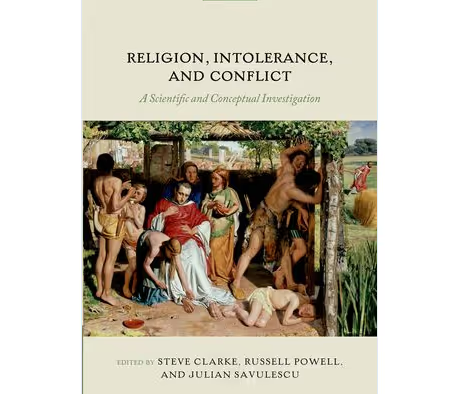These last years, evolutionary studies of religion gained momentum throughout the scientific world. Now, the findings are increasingly applied to contemporary discussions about the functions and roles of religion.In their groundbreaking anthology, Steve Clarke, Russell Powell and Julian Savulescu are bringing together leading evolutionary and non-evolutionary scholars to debate Religion, Intolerance, and Conflict (Oxford University Press 2013).

Two of the editors start by outlining the “scientific and conceptual investigation” of the book. Then Harvey Whitehouse explores the effects of religious ritual on (in-)tolerance, distinguishing rare and traumatic from frequent and routinized ones. Whereas the former show potential in bonding small groups, the latter tend to build cohesion within larger groups. But the enhanced in-group cooperation may come with a price concerning relations to non-members.Robin Dunbar proceeds with a discussion about the importance of group size in human evolution. According to Dunbar, religion was “crucial” in forming larger, cooperative groups of 100 – 200 people into cohesive societies, whereas bigger religious communities tend to fragment.Dominic Johnson and Zoey Reeve argue on a line which was presented by Charles Darwin himself: Those groups prepared for war by shared religious beliefs might have been able to overcome those less religious in our past. In their concluding sentences, they also point out that the religious tend to have more babies than the non-religious. Whether religiosity evolved by augmenting “cooperative breeding”, “cooperative killing”, or both remains to be explored.The question of whether and what religious beliefs are correlated with higher levels of out-group prejudices is addressed by Dan Batson, Anna-Kaisa Newheiser, Miles Hewstone, Alberto Voci, Katharina Schmid, Andreas Zick, and Beate Küpper in the following two chapters. Based on a range of increasingly convincing studies, they conclusively show that religious individuals tend to be more group-inclusive and prejudiced, with the fascinating exception of those believers living “religion as a quest” of dialogue and learning.Will M. Gervais and Ara Norenzayan present key findings of their psychological experiments concerning anti-atheist prejudices. They are able to show conclusively that prejudices against atheists do not derive from fear (as with racism) or disgust (as with homophobia), but from distrust: As atheists do not feel observed by supernatural agents, they are less trusted to be reliable politicians, to stick to rules or to care for children. But the international results are indicating: Anti-atheist prejudices are fading away with increased strength of secular institutions and a growing atheist share of the population.Joshua Thurow and Tony Coady proceed in separate chapters to discuss terms such as “religion” and “tolerance” critically, pointing out that all of us are using them as a way of constructing narratives serving our cherished (and sometimes subconscious) convictions.Roger Trigg presents his thoughts on “Freedom, Toleration, and the Naturalness of Religion”. From my knowledge, this is the first essay bringing the legal history of religious freedom into dialogue with the recent findings of evolutionary studies of religion. Hopefully, this brilliantly reflected approach will get the interfaculty readership it deserves!Then Owen Flanagan proceeds to consider whether Buddhism and Confucianism “may” be more tolerant than Abrahamic-Monotheist religions. But his chapter suffers under the same weakness as the next one by Walter Sinnott-Armstrong about how religion “may” undermine compromise: Although both authors are presenting interesting speculations, they do not offer any empirical data supporting them.The book closes with a chapter by Ingmar Persson and Julian Savulescu that discusses strategies of overcoming (!) religion by enforcing a closed, scientific worldview: “Since religions have a dwindling epistemic credibility, no conduct should be legally permitted or prohibited simply on the basis of religious considerations: there must be a sufficient secular justification for this permission or prohibition” (p. 250). Accordingly, they demand not only the legal abolishment of circumcision for boys, headscarves for women and religious food, but also for the proscription of any (!) religious education (“indoctrination”) of children. By thereby demonstrating the oppressiveness of their atheistic, non-evolutionary, and rationalistic line of thinking, they are soundly reminding readers that intolerance “against” religions has been a marked feature of the 20th century and is still alive.In sum, I can only recommend this anthology to anyone interested in religion, evolution, legal history and philosophy. Although not all chapters are of the same quality, there are more than enough gems included for repeated readings, thoughts, and quotations.



